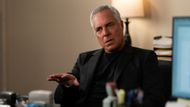When Ballard landed on Prime Video, it didn’t take long for fans of the Bosch universe to start asking questions. Some were curious about the cases. Others focused on the tone. But a recurring question stood out early on: Does Harry Bosch appear?
He does. Not as the lead, though. And not as a nostalgic nod either. His presence feels more deliberate, something placed there for a reason. He comes in when the story allows it, does his part, and then steps out. No buildup, no extended return. Just Bosch, doing what he’s always done, but under new conditions.
The show introduces Ballard, played by Maggie Q, as a determined detective leading the LAPD’s cold case unit. The city around her is familiar, but the energy is different. It’s faster, a little rougher. And into that space, Bosch steps in now and then. He’s not taking over. Just helping.
How Bosch fits into the new rhythm
Titus Welliver returns to the role with the same quiet gravity as before. He isn’t trying to stand out. That’s not the point anymore. His version of Bosch feels older here and more reserved. It’s like he knows the world’s moved on a bit, and he’s okay with that.
There’s one moment in particular where his presence changes the room. No dramatic music, no big speech. Just a case file, a wall of photos, and him standing beside Ballard, reading between the lines. Nothing flashy. But it works.
Bosch doesn’t ask to be followed. He offers support, and Ballard decides what to take. There’s a rhythm to it. A give and take that feels grounded. No hierarchy. Just two people looking at the same problem from different angles.

A new dynamic built on silence
What makes Bosch’s return effective isn’t what he says. It’s what he doesn’t say. There’s a lot of silence in those scenes, and that silence holds weight. He lets Ballard lead, and when he speaks, it’s usually to point something out that others missed.
Their relationship isn’t overly explained. It doesn’t need to be. There’s mutual respect there, the kind that builds over time and doesn’t need constant reinforcement. That quiet understanding becomes the foundation of their dynamic.
They don’t try to be partners. They just are, for brief stretches of time, and that’s enough. No need for long conversations or emotional backstories. The connection is already in place, even if the screen doesn’t spell it out.
What makes Ballard different
The series doesn’t try to copy what came before. It has a different tone, more procedural and stripped down. Ballard moves quickly. The cases keep coming, and the system doesn’t leave much room to breathe. That’s the pace she works with.
In contrast, Bosch brings a different rhythm. Slower, more considered. And when he shows up, the energy shifts. Not completely, but enough to notice. It’s like a reminder of how things used to be, without dragging the story backward.
Ballard is more direct, works inside the system, trying to make things move from within. Bosch, on the other hand, always leaned into friction. That contrast makes their scenes interesting. It’s not a conflict exactly, but it’s not a perfect alignment either.

Bosch was always part of the plan
According to what’s been shared publicly, bringing Bosch into Ballard was never an afterthought. It was part of the design from the beginning. His role was supposed to be small but meaningful, serving the story without taking focus away from the new lead.
In that sense, the show sticks to its plan. Bosch appears where it makes sense. He doesn’t show up just to please longtime viewers. He has something to contribute each time. A detail. A question. A different way of looking at the case.
This version of the character knows when to step back. And the show benefits from that. It gives her the space to develop while still acknowledging the weight Bosch carries in that world.
When and where to watch
The show premiered on July 9, 2025, on Prime Video. The season includes ten episodes, all released on the same day. Anyone familiar with the Bosch series will recognize the mood, though the structure is more streamlined.
The reception so far has been mostly positive. Critics pointed to Maggie Q’s performance as a strong anchor and noted how the show avoids leaning too heavily on past characters. Bosch’s role, while brief, has been seen as a smart choice. It ties the series together without slowing it down.

Wrapping up
Bosch is in Ballard, but he’s not running the show. He steps in when needed, adds what only he can, and leaves. That’s what makes his appearances work. They feel earned.
The series doesn’t pause for him. It keeps moving. But when he’s there, the story shifts just slightly. It’s not about reclaiming space. It’s about reminding viewers what this world has already survived and how much work there still is to do.
For fans of the original series, that presence is enough. It adds depth without pulling the focus. And for newcomers, he’s just another part of the landscape, moving through quietly, helping in his own way, then gone again.
